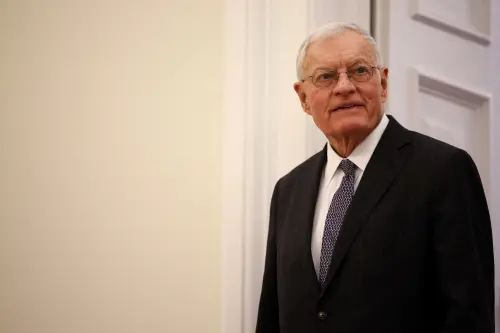Russian officials have expressed their reluctance for Russia-Ukraine envoy Keith Kellogg to participate in high-level discussions to resolve the conflict, according to a U.S. official and another source familiar with the situation.
Kellogg has been notably absent from recent crucial talks, such as the meeting with U.S. National Security Adviser Mike Waltz and Secretary of State Marco Rubio earlier this week, and a high-level meeting in Saudi Arabia with Russian officials in February.
The reasons for Kellogg's absence are unclear, and the timing of the Russian officials' request remains unknown.
Despite the Russian request, Kellogg's presence persists as he delegated a high-ranking staff member, Eli Rosner, to attend the recent meeting in Saudi Arabia.
Although the Russian embassy in Washington did not respond immediately to a request for comment, National Security Council spokesperson James Hewitt emphasized Kellogg's pivotal role in resolving the Ukraine conflict, mentioning the President's deployment of senior officials to aid in this effort.
The devastating impact of the conflict, which has resulted in casualties, mass displacement, and severe destruction, has intensified tensions between Russia and the West, leading to a significant confrontation.
Following the U.S.-Ukraine meeting in Saudi Arabia where a 30-day ceasefire was discussed, Russian President indicated a need for substantial revisions to the ceasefire proposal.
The reported Russian request to exclude Kellogg stems from concerns of some former Russian officials that view him as overly sympathetic to Kyiv.
Kellogg, a retired lieutenant general, has been vocal in condemning Russian aggression in Ukraine, including a forceful critique of Russia's Christmas Day attack on Ukrainian towns.
Despite his stance on Russian aggression, Kellogg has consistently supported Trump's policies regarding the conflict, such as the recent decision to halt certain intelligence sharing with Kyiv.
Kellogg's background includes serving as the chief of staff to the National Security Council during Trump's presidency and as the national security adviser to former Vice President Mike Pence.
He engaged in discussions with President Volodymyr Zelenskiy in Kyiv and held meetings with various NATO leaders across Europe.
While some of Trump's supporters find Kellogg's approach too aggressive, others believe that diverse perspectives within the advisory team are beneficial for the President.
